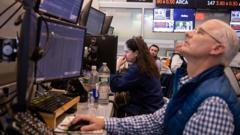In a surprising market twist, US stocks experienced their largest one-day increase since 2008 after President Donald Trump announced a halt to previously planned steep tariffs on goods from most countries, opting instead for a 10% import tax rate.
US Stocks Surge as Trump Suspends Tariffs

US Stocks Surge as Trump Suspends Tariffs
Historic rally ensues following President Trump's decision to suspend tariffs on various goods, except for China.
US markets soared on Wednesday after President Trump revealed a major shift in trade policy, suspending steep tariffs on goods from a range of countries while simultaneously increasing tariffs on Chinese imports. This unexpected announcement caused the S&P 500 to surge by 9.5%, marking the most significant one-day gain since 2008.
Just hours prior, the initial implementation of tariffs sparked panic, resulting in a nearly 10% drop in the S&P and escalating fears of an impending recession. Market analysts noted the market turbulence was exacerbated by investors' responses in the bond market, which sent initial signals that Trump needed to reconsider his tariffs strategy.
With the Dow rising over 7.8% and the Nasdaq achieving a remarkable 12% increase, major companies saw substantial stock gains. For instance, Nike's shares jumped 11% and Apple experienced a 15% boost. Despite the day's gains, projections indicated that the leading market indexes still trailed their previous performance prior to Trump's initial tariff announcements.
The president's decisions followed growing political pressure from notable figures, including influential business leaders who had previously supported him. As he acknowledged the concerns of the market, Trump hinted at potential tariff exemptions for individual companies. However, he maintained his commitment to duties on specific sectors, such as vehicles and steel, amidst ongoing negotiations with China, America's largest source of imports.
In light of this tumultuous week, analysts speculated that a comprehensive resolution to the trade dispute would be challenging, with complete rollbacks of tariffs appearing unlikely. Trump's trade maneuver was seen both as a response to market volatility and as a reflection of the pressures faced by his administration.
As the dust settles from this dramatic pivot in trade policy, investors remain cautious about the long-term implications of these tariffs, and Goldman Sachs recently adjusted its recession outlook, indicating ongoing uncertainty in the US economic landscape.


















